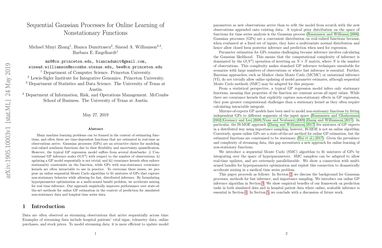Sequential Gaussian Processes for Online Learning of Nonstationary Functions
Many machine learning problems can be framed in the context of estimating functions, and often these are time-dependent functions that are estimated in real-time as observations arrive. Gaussian processes (GPs) are an attractive choice for modeling real-valued nonlinear functions due to their flexibility and uncertainty quantification. However, the typical GP regression model suffers from several drawbacks: 1) Conventional GP inference scales $O(N^{3})$ with respect to the number of observations; 2) Updating a GP model sequentially is not trivial; and 3) Covariance kernels typically enforce stationarity constraints on the function, while GPs with non-stationary covariance kernels are often intractable to use in practice. To overcome these issues, we propose a sequential Monte Carlo algorithm to fit infinite mixtures of GPs that capture non-stationary behavior while allowing for online, distributed inference. Our approach empirically improves performance over state-of-the-art methods for online GP estimation in the presence of non-stationarity in time-series data. To demonstrate the utility of our proposed online Gaussian process mixture-of-experts approach in applied settings, we show that we can sucessfully implement an optimization algorithm using online Gaussian process bandits.
PDF Abstract

